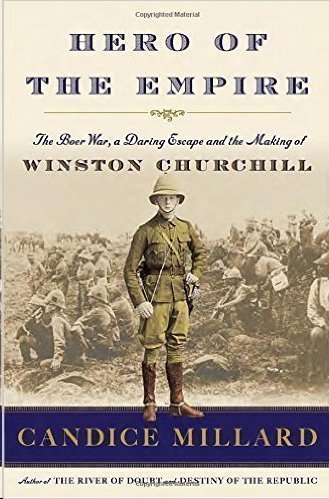"Hero of the Empire" by Candice Millard

"Hero of the Empire - The Boer War, a Daring Escape, and the Making of Winston Churchill." Candice Millard. 318 pages.
The two young men, Churchill and Gandhi, together on the South African veld during the Boer War, would go on to become two of the most recognizable icons of the twentieth century. Their forty-year rivalry would seal the fate of India and the British Empire.
I completed reading this book today.
In 1996, TIMDT and Mwah (sic) stood against the rail of our Silver Sea cruise ship at the Durban, South Africa dock. At least a hundred local white spectators stood on the dock looking wistfully, or so it seemed to us, at our ship.
Little knew we then that ninety seven years previously, 1899, at the same dock, Winston Churchill, only 26, had stood on a ship's deck addressing a welcoming Durban throng. He was the Boer War correspondent for the Morning Post, a conservative newspaper published in London from 1772 to 1937. Only four days earlier, Churchill had escaped from a Boer prison camp in Pretoria, Transvaal, and had worked his way east, 300 miles to Lourenco Marques, on the Indian Ocean in neutral Portugese East Africa (now Mozambique).
Britain's war against the Boers had not been going well. The Boers used Zulu tactics. They hid behind trees and in ravines. To the British, this was not a sporting way to fight, but, after suffering numerous defeats the Brits got the message and adapted their own fighting style to suit the circumstances.
After his daring (for sure) escape, and despondent about Britain's seeming difficulty in fighting the Boers, Churchill wanted back into the fray. Even then he had designs for high office in Britain and he knew that war heroics would take him far politically. He gained a military commission (giving up his correspondent position), fought in several battles, and freed British prisoners, friends of his from the Pretoria POW camp where he, himself, had been imprisoned.
As a well known war hero, Churchill returned to England after the war and launched a political career. The rest, as they say, is history.
Churchill's escape from a POW camp in Pretoria, and his furtive Odyssey 300 miles east to neutral Portugese East Africa, is the core story told by the book. The account is easily read and "page turning."
In addition to the prison escape, Millard's book chronicles Churchill's beginnings as the aristocratic son of a former Chancellor of the Exchequer and his wealthy, American socialite wife. Considering his uppity background, Churchill was self confident from the beginning. He was brave to the point of folly. And, he was a staunch advocate of the British Empire, then, at its apex under Queen Victoria.
Churchill's "empire advocacy" has been read as Anglo racial superiority by many, including President Obama, who returned a White House located Churchill bust to the UK immediately on taking office as US president in 2009. Donald Trump, newly elected, has asked that the Churchill bust be returned to the White House.
To be sure, there is much "outspoken-ness" in Churchill's writings that in today's context could be interpreted as racist.
Writing in "The River War," his account of the British retaking of Sudan, published in 1899, Churchill noted the threat to Western Civilization radical Islam poses:
"Individual Moslems may show splendid qualities. Thousands become the brave and loyal soldiers of the Queen: all know how to die: but the influence of the religion paralyzes the social development of those who follow it. No stronger retrograde force exists in the world."
During the Boer War, Mohandas Gandhi (not yet Mahatma), a young attorney working in Natal, suspended his efforts to achieve full citizenship in the various South African republics. He organized a corps of Indian stretcher bearers numbering 2000 to support the British cause.
There is no evidence that Gandhi and Churchill met during the South Africa period. However, Gandhi and his stretcher bearer team were at the Battle of Colenso, December 1899, British General Redvers Buller's disastrous first attempt to cross the Tugela River in Natal, one of the three battles of "Black Week," a low point in British performance during the Boer War.
Churchill was in the Boer POW camp in Pretoria at the time of Gandhi's presence at the Battle of Colenso.
In regard to the three or four page account of Gandhi as the leader of the stretcher bearers, Millard's account intersects with another account of same that I have read within the last 12 months, from Ramachandra Guha's, "Gandhi Before India."
The two young men, Churchill and Gandhi, together on the South African veld during the Boer War, would go on to become two of the most recognizable icons of the twentieth century. Their forty-year rivalry would seal the fate of India and the British Empire.
Churchill would be an ardent opponent of Indian independence. But, after the war, he lost power. His Conservative Party lost handily in the 1945 elections to Clement Atlee's liberal party. And, Atlee, much to Churchill's chagrin, called for India's independence.
But, Gandhi was also disappointed at the outcome of India's quest for Independence. He was vehemently against the partition of India and Pakistan, something that all had to accept given the intransigence of Mohammad Ali Jinnah, who insisted on a separate Muslim dominated state separate from India proper.
Neither Gandhi nor Churchill were fully satisfied at the denouement of Indian independence.
But, I digress!
"Hero of the Empire" is an easy reading book, likely drawing from the O'Reilly/Duggard new style of "dumbed down" history writing. Abstruse, the book is not. But, it seems well documented. It was good reading on the plane where, at least for me, its difficult to concentrate on "deep stuff." I learned stuff I didn't know.
SDT
New Delhi, India 26 January 2016.
Attachments area